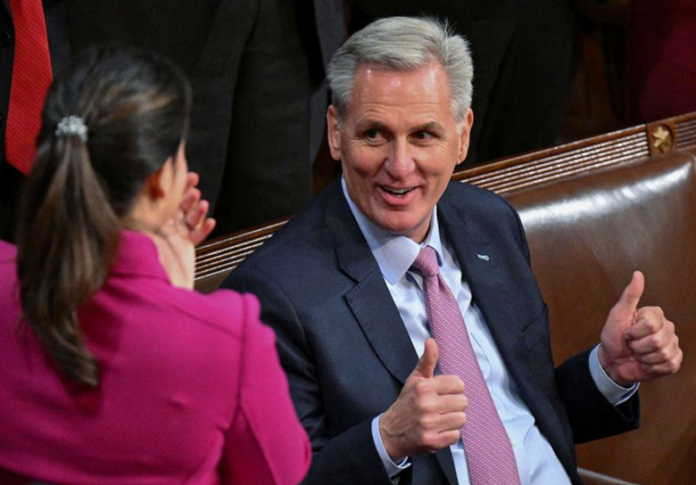
By Will DeMartinis
This past week, the victors of the 2022 midterm elections were sworn into their two year terms–just like the 118 times prior. However, this process was not one of routine; instead, it was marred with the failure to elect a speaker and almost persistent negotiation to get one. It wasn’t until early in the morning of January 7th that the house finally decided on who the next speaker would be: U.S. Representative from California’s 20th congressional district Kevin McCarthy (R).
As such, the question remains: why did it take so long for house Republicans to decide on a speaker? The answer lies in the 2022 midterm election itself. Democrats, while losing the house majority, managed to keep Republicans in a slim 5-seat majority, giving the right flank of the Republicans much more influence and power in general lawmaking come time.
Due to Kevin McCarthy’s perception as a moderate Republican and his less than stellar reputation with the right of his party, his speaker vote didn’t proceed as expected. In what became a burning symbol of failure in his leadership before his leadership even began, McCarthy failed to earn enough votes to become speaker through 16 house voting ballots, something that had failed to happen in over 100 years.
It took several days and many concessions from McCarthy to his party’s right flank for him to finally earn enough votes to become speaker of the house on the 16th ballot, with some of the most prominent being giving any Republican lawmaker the ability to call for a vote to depose the current speaker of this house. This means it would require only 1 representative to call for such a vote, vesting great power into the hands of his right flank and leaving him constantly on the hot seat.
Now, with the events having subsided, it’s unclear how much this failure has tarnished Republicans in the house. What it undoubtedly means is Kevin McCarthy may be a much weaker speaker than any we’ve had in decades–a far cry from his predecessor Nancy Pelosi (D), who along with representatives Steny Hoyer & Jim Clyburn made up the house’s leadership bigwigs in the past 4 years of a Democratic majority.
However, this past inauguration also marks the first time since 2018 where Democrats will be the largest party in the house–something which brought on a changing of the guard en masse for Democrats. The first ever Gen Z member of congress, Maxwell Frost, was sworn in. Democrats also have a new speaker in waiting, Representative Hakeem Jeffries. The next two years will be very interesting, to say the least, and one where the unity of Republicans will be tested, along with Kevin McCarthy’s leadership skills. It’s also unclear just how much legislation will actually pass this divided house, as the Democrats control the Senate and the Presidency, thus staining the Republicans ability to pass legislation, let alone if they can pass it themselves.
